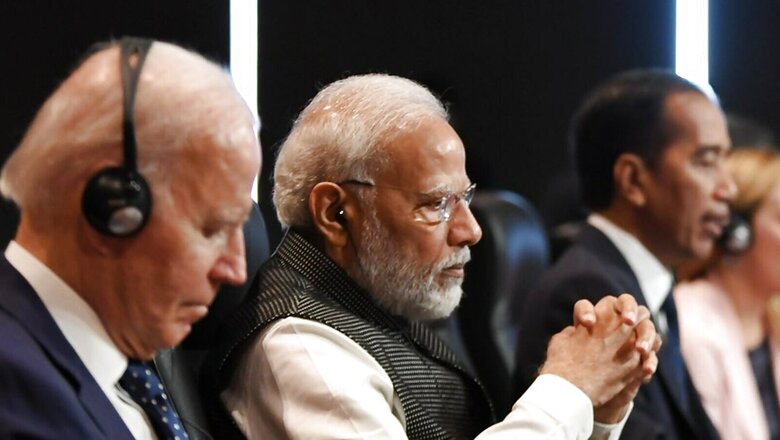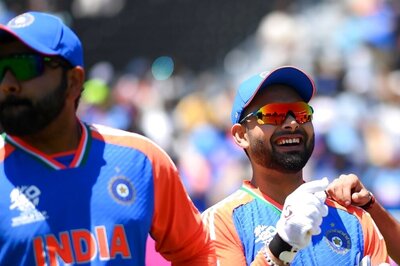
views
The 17th G20 heads of state summit kicks off in Bali on 15-16 November in a rapidly changing geopolitical landscape. The Group of Twenty (G20) represents over 80 percent of the Gross World Product (GWP), 75 percent of global trade, 2/3rd of the world’s population, and 60 percent of the world land area. While the grouping seems very inclusive, it is highly dominated by the world’s largest economies given its nature and has limited representation from developing countries and heavily indebted poor countries, which often bear the brunt in economic and environmental terms of decisions taken by what is the big boys club.
While this year’s G20 will be focused on the environment, global warming and recovery from the pandemic, it is also a key milestone in several areas. The first focus will be the Russia and Ukraine war which is wreaking havoc on the global economy, increasing food and energy insecurity with record inflation globally. While the last G20 heads of state summit in Rome had focused on the pandemic and supply chain resilience, most leaders hadn’t expected to be faced with an imminent food and energy crisis within 12 months. Russia’s Ukraine invasion changed all of that.
This G20 is more important for the bilateral meetings at the sidelines, especially given its position in the Indo-Pacific, the hotspot for the next global showdown. Indonesia, a secular, multicultural South East Asian power in its own right, is also the most populous Muslim country in the world. The presidency will pass from Indonesia at the end of this summit, to India, the third country by population of Muslims globally and the world’s largest democracy. The UN predicts that by the next G20 heads of state summit in Delhi, India will surpass China as the world’s most populous country. The cultural crossroads that the world finds itself with Islamic extremism and the imminent threat that democracies perceive in South East Asia due to Chinese aggression are pertinent topics that both India and Indonesia regularly deal with. Indonesia, in its wisdom, has hosted this year’s head of state summit in Bali, a Hindu-majority island in a Muslim-majority secular country.
In this setting Bali is a huge milestone for the world’s powers to set across their differences and decelerate the march to a global conflict which has so far seemed imminent. For the first time two Hindu Prime Ministers will be present at a G20 summit, India’s Narendra Modi and the UK’s Rishi Sunak. Sunak is the United Kingdom’s first Prime Minister of colonial origins. It is also a first for Italy to be represented by a young, female Prime Minister. Giorgia Meloni’s first multilateral engagement after the COP in Egypt will be the G20 summit where she will meet Joe Biden, Modi, Xi Jinping and other international leaders in bilateral and multilateral settings. She will be the only female leader to represent a G20 country with 18 male colleagues, a sad testament at the gender gap that plagues the leadership of the modern world. The only other female leader present is Ursula Von der Leyen, the President of the European Commission.
In his second international trip after the start of the pandemic, President Xi Jinping seems to have struck a Pacific chord. It is also his first multilateral summit after the Chinese Communist Party elected him for a third mandate as the country’s supreme leader, confirming the concentration of all power in his hands. China has officially moved from being a single party governed country to formally a dictatorship.
Xi’s three-hour meeting with Biden has struck a very conciliatory note with China denying having been informed of Russia’s “special military operation” during President Vladimir Putin’s visit to Beijing in February for the winter Olympics. Xi’s current posture is radically opposite to the bellicose China during US Speaker Nancy Pelosi’s visit to Taiwan. China’s current posture at G20 could also stem from its leader’s undisputed control of his country and hence the lack of need for grandstanding. The pacifist Xi could also be because sanctions are already affecting China’s bottomline and a change in attitude could help de-escalate the tensions allowing Xi to concentrate on building back China’s economy which has suffered during the pandemic.
Xi Jinping is not the only leader who is looking to use the Bali summit to turnaround his political fortunes. The recent terrorist attack in Istanbul has created the opportunity for the Turkish President to use the G20 for furthering his agenda of forcing the US to allow him to act against the Syrian Kurds. In record time, Turkish intelligence has pinned the Istanbul attack as having originated from Kobani and Turkey’s Ministry of Foreign affairs has rejected the US embassy’s condolences. It is expected that Erdogan will use the facetime with world leaders and President Biden to use the recent Istanbul attack to maximise gains on the Kurdish front. Turkey continues to use its veto at NATO for Swedish and Finnish entry to the transatlantic club, potentially on the behest of Russia.
The most important moves are probably expected from the conspicuously absent Russian President and now global pariah, Vladimir Putin. Indonesia has withstood pressure to disinvite Russia from the summit and the country is represented by Foreign Minister Sergiy Lavorov.
Russia’s strategic withdrawal from Kherson days before the G20 heads of state summit in Bali could be a prelude to the start of a negotiation between Russia and the world powers? Bali will definitely be crucial to any informal feelers the Russians want to float with the US and the international community for a potential peace deal.
Despite Bali’s peculiarity, the fallout of all negotiations and backroom deals in the Indonesian island will continue in New Delhi as India will receive the gavel at the end of this summit and assume the G20 presidency from the 1st of December. While Prime Minister Modi has announced a continuation of his “Vasudhaiva Kutumbakam” or the “world is but one family” as India’s diplomatic credo and G20 theme, it is Modi’s shoulders which will inherit any mediation in this rapidly evolving global drama.
India’s G20 year promises to be anything but dull. With a full pandemic recovery and tensions in Asia with China, India also inherits the moral responsibility to see to its Russian ally’s ambitions being checked. It will be Modi’s achievement if he is able to use this platform to create peace in Europe and strike a balance with arch-rival and neighbour China. Both Modi and Xi recognise that if this has to be “Asia’s Century”, then the Chinese Dragon and Indian Elephant must dance and the Indian G20 could be the right opportunity to make a start. Will Xi and Modi use this opportunity to create a peace deal between the two Asian giants? Only time will tell.
Above all, Modi has the power to make G20 beyond economics by making it more inclusive by inviting guest countries to represent the voices of the vulnerable. In 2022 where the world is closer to a nuclear World War III than it ever been and we are on the precipice of an environmental and economic Armageddon, India’s leadership could prove to be decisive to create an inclusive environment and address other unending conflicts such as Somalia, Syria, Yemen, Libya while creating a new diplomatic paradigm to global problem solving.
The largest democracy and soon to be most populous country has the credential and the sheer power of humanity to create the change and it also has the most to lose in case of failure. It is on the foundations of Bali, an ancient Indian city, that India’s future as a superpower begins.
Vas Shenoy, an Indo-Italian entrepreneur and writer, has worked closely and continues to advise various governments Europe, Middle East and Africa. The views expressed in this article are those of the author and do not represent the stand of this publication.
Read all the Latest Opinions here




















Comments
0 comment